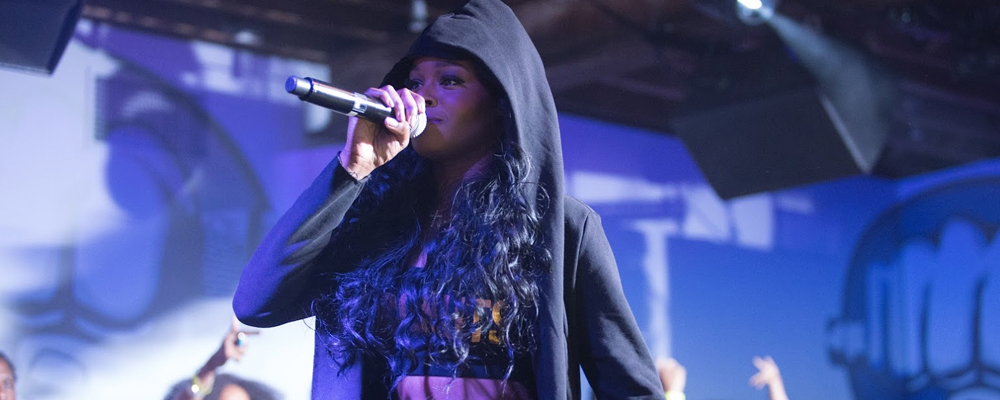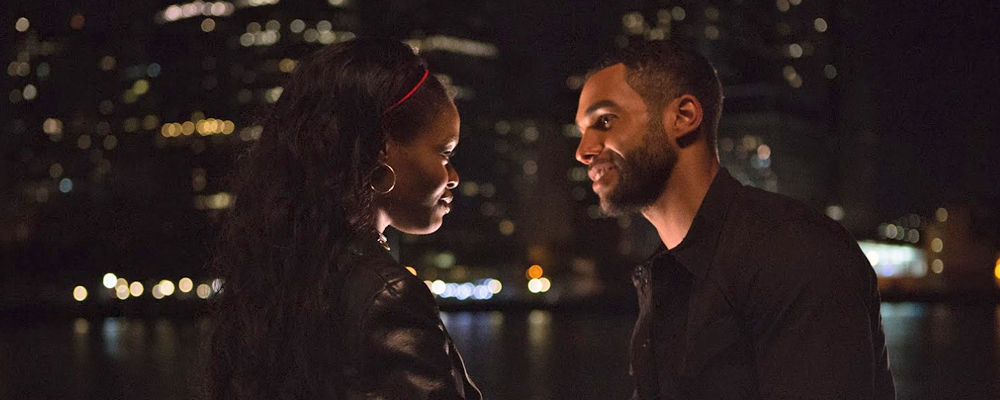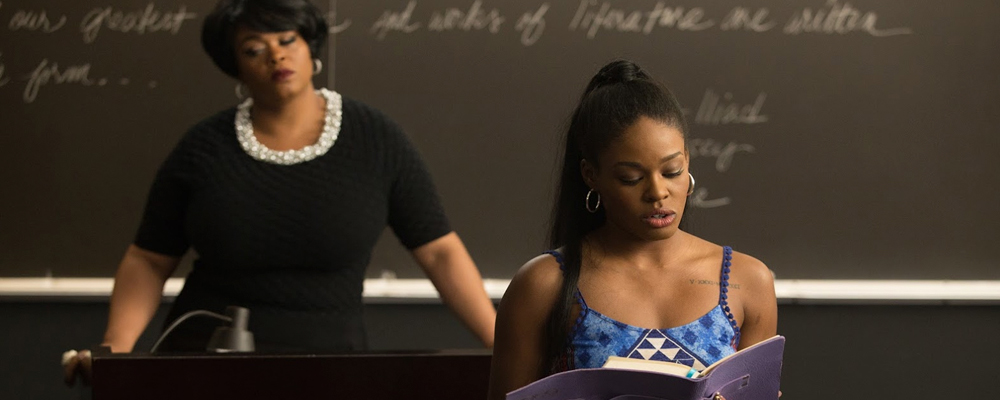Poetry and Hip-Hop Clash in Entertaining ‘Love Beats Rhymes’
Alex Aronson
“Love Beats Rhymes” is an energetic, literate date movie that also works as a look at the cultural clash between hip-hop and poetry. Some may scoff at how this film’s main plot never deviates from what we expect. The romance and personal battles tend to develop the way they always do in these stories, but there’s also enough focus on the power of language and the beauty of poetics to make it engaging, despite its imperfections. In a time when hip-hop is treated in film with a string of thugged out clichés, here is a genre movie about debating the merits of rap in a university setting, and where a strong woman lead finds discovery in the craft of words.
Azealia Banks stars as Coco, the scorching female member of a New York rap group specializing in blistering, edgy rap battles in the city’s underground music scene. The alpha male of the group is her sometime lover Mahlik (John David Washington), who insists they maintain a thug life image despite the fact that none of them have ever even been in a gang. Their chance for a big break comes when a label offers them to chance to make a demo. As the group prepares to get serious, Coco decides to return to college under pressure from her mother. She enrolls in a poetry class taught by the refined, pretentious Professor Dixon (Jill Scott), who scoffs at Coco’s insistence that rap is poetry. Also raising his nose is Dixon’s assistant, Derek (Lucien Laviscount), who dreams of joining a major Slam poetry competition team led by poet Coltrane (Common). As Coco attempts to shed her rap habits and learn the craft of poetry, a bond forms with Derek that will change him as well. Meanwhile Coco’s bandmates struggle with adjusting with her new creative direction.
Some small films find their charm in delivering exactly what they promise and adding a little more. “Love Beats Rhymes” is that kind of movie. It is directed with a mixture of urban grit and diversity by RZA, a hip-hop icon in his own right, who knows the ins and outs of the rap battle world. The opening scenes and subsequent stage moments have a vibrant flow and charging rhythm. Banks shines in these moments because she is herself an important music personality, having defined the style known as “witch-hop.” The underground club world is filmed with vibrant colors confined in crammed spaces. Sometimes RZA gets a little carried away by the flash of cinema, giving us moments that might seem a little too choreographed, but it’s never a bore to watch.
It’s when RZA moves the film into the university world that the movie becomes eclectic and interesting. It is here that film reveals its true nature, that it isn’t so much about the rap battle culture but about the nature of rap itself. In an insightful early scene Dixon tells Coco that hip-hop has descended into misogyny and cliché, offering little literary value (“Hip-hop turned its back on us”). In another scene Coco bluntly tells the members of her rap crew, “we’re not in a gang, we don’t even have guns.” These moments form a challenging statement from RZA for the audience, and it is refreshing to see such debates in a popcorn movie. Coco and Dixon face off class after class, with Dixon challenging Coco to truly discover how poetry works and the potential it offers for finding power in words. The film contrasts the rap battle world with the Slam poetry culture, providing a nice contrast between two art forms based on finding rhythms in language. The Slam poetry scenes are fun simply by letting poets perform onscreen, in different styles and tones. Common here is erudite coolness as Coltrane. Much of the film’s middle section is a vibrant celebration of urban poetry culture.
It is true that the rest of the plot develops according to plan. Coco and Derek start falling in love, Mahlik gets jealous, and Dixon turns out to be more of a villain than we might realize at first glance. At times the soundtrack becomes too intrusive, with one R&B song too many interrupting conversations that would work better without music. The difference is the screenplay by Nicole Asher and Nicole Jefferson is offering us date movie mushiness with a little more thought. Derek and Coco’s relationship blooms based on their mutual experience with words and poetics. Derek strives to teach Coco how poetry works, and she in turn will open him more to the linguistic power of rap. Derek is of course the pop ideal of a poet, buffed and ready for a love scene, but we can forgive the movie its faults. The conflict in the story is based on attempting to write a poem or proving that an eloquent song is better than a shallow one.
“Love Beats Rhymes” gives us all of those date movie moments we are so used to, complete with the passionate kisses and jealous glances. But here it is all background to a fascinating battle of words. Yes, it’s a calculated date movie, but one that values paper and pencil to candlelight dinners.
“Love Beats Rhymes” releases Dec. 1 in select theaters and On Demand.



